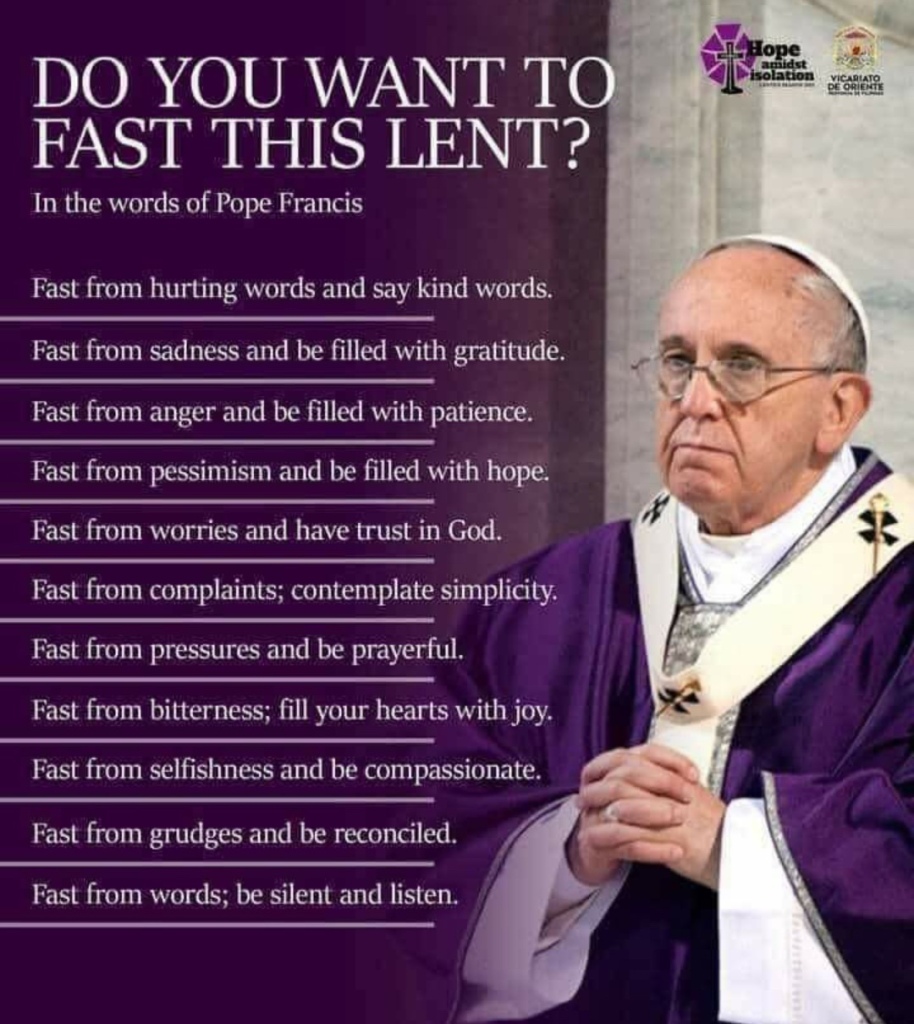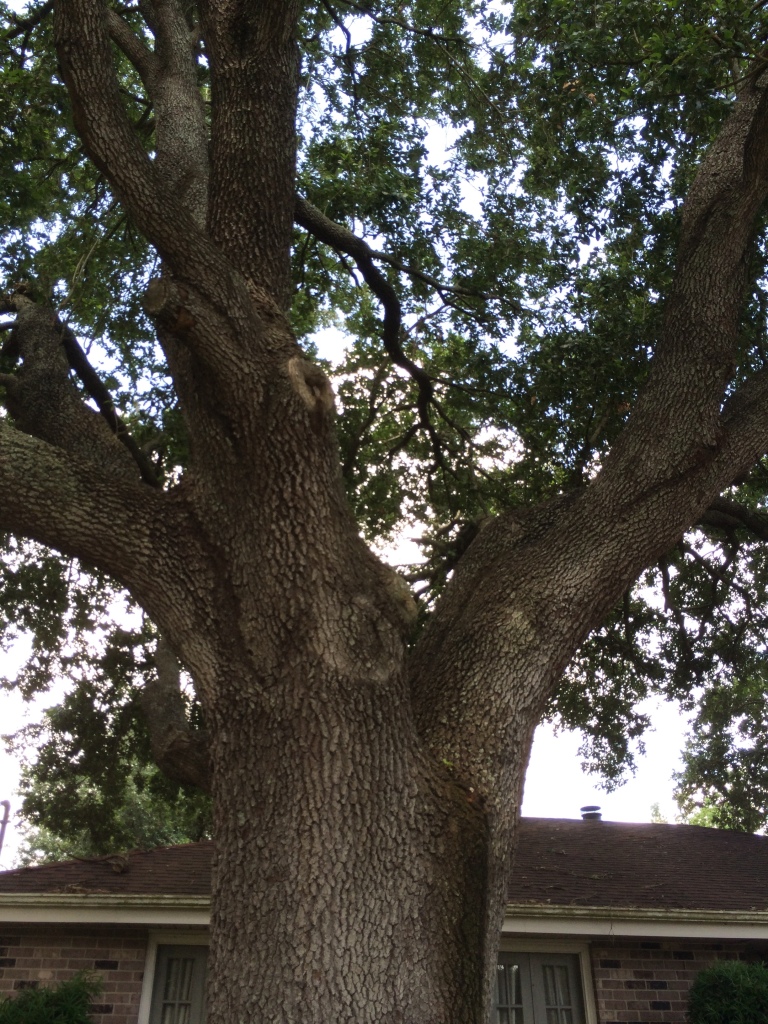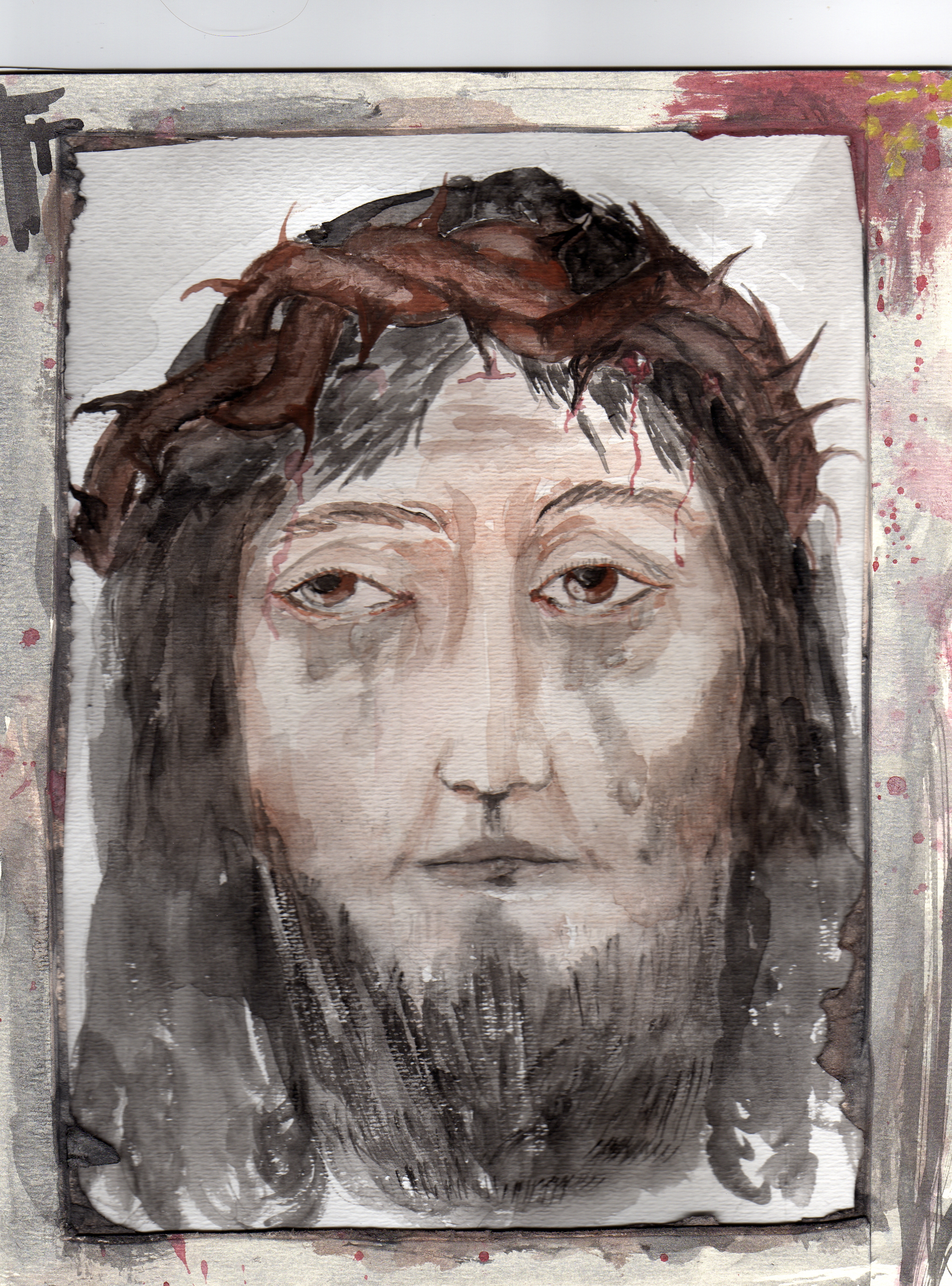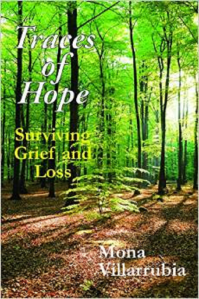You are currently browsing the category archive for the ‘Catholicism’ category.

I painted this some years ago. A copy of a magazine cover. It’s only looking at it now that I am offended by how white he is portrayed to be. And I realize even more clearly that Christian beliefs have been developed through a particular lens, one that makes it easier to hate people of color and Jews.
If Jesus were portrayed with more obvious Jewish features and dark-skinned – as he actually was historically – I wonder what impact that would have now or have had before? Would white supremacists have been able to comfortably claim to be Christian? Would the Clan have used the cross as a symbol of power?
History is written by those in power. Christian history is no different. Jesus is portrayed as having European features in many early depictions. A Roman not a Jew.

As a child of wonder I felt god in the deep thrum of the church organ, in the soaring notes of the hallelujah chorus.
I felt god in the candle light and smelled god in the incense. I was held by god in the warmth and the dark wood and the solid pews while outside it rained and snowed and the howling wind blew garbage along grey, unkind streets.
I did not see god on the altar in the clothes of my abuser. I did not hear god in the droning of the empty latin words. But when they were sung, ah, then, then my heart soared.
I did not feel god in the dark whispering box or in the hastily recited prayers.
I did not know god when priests claimed my body; they were not searching for god between my legs.
But later, much later, as a teacher on a senior retreat I found god and I cried. I cried because god was crying … for me. Imagine! In the dark of the chapel and outside in the trees god offered the love I craved, father, brother, mother, friend. And the gift broke me. I felt ashamed and unworthy and ran from god.
For years I still sang, of Jesus and God. But it wasn’t my god. For years I intoned the words of the rituals and adapted to the changes. They didn’t mean anything anyway. I baptized my sons and shuddered at the obscenities of the vows made – asking us to reject a mythical demon under threat of everlasting torment – also mythical, and medieval. But it wasn’t my god.
Yet there were tiny slivers of gold to be discovered in the mud and muck on the banks of the river of Catholicism. Matthew Fox worded a truth I already knew in my very being, in my cells: creation was good, good is god, humanity and all the created order are of god and therefore intrinsically blessed. The bible author who scribed Genesis chapter 1 knew it three thousand years ago. But his voice had lost out to the pagan superstitions that found an answer to the problem of suffering and evil in a talking snake and a magic tree. And Augustine, the suffering, morally quaking, self-hating monk of the 4th century found his answer there too. Humanity was banished from Eden to be conceived in pain and suffering and thereby pass on our guilt through the act of procreation. Only the blood-letting of a divine being could undo that banishment.
As a mother I had known organically that my children were conceived in love and goodness and born in purity and goodness and grace. The church had never spoken the truth that resonated somewhere deep in every mother’s womb, like the thrum of a great pipe organ intoning the miracle of conception, life, birth. As Catholic women we knew the doctrine of the fall and original sin. We may have sensed its disordered theology but few of us had the opportunity to study and challenge these doctrines. As a student of theology these doctrines exposed themselves to me as a warped and twisted untruth born of a tortured psyche overwhelmed by his own desires and his own dis-eases of the spirit. Augustine was a great theologian whose mind was infected by the “demon” of self-hatred. And his dis-ease has contaminated Christian the theology of creation and humanity for two thousand years, not just in Catholicism but in the conservative strands of Protestantism too.
Matthew Fox had written the truth. He was a beacon in my spiritual darkness.
Then there was the nature of the Church and the priesthood. The complete contradiction of a theology of the ontological superiority of ordained priests and a systemic approval of pederasty, pedophilia, and the grooming and seduction of vulnerable adults in the Catholic church was enough to make any educated Catholic shudder. So it was important that Catholics remain uneducated in their own theology and history and kept firm in their faith and credulity. But I was educated theologically and experientially: I knew, in a knowing that was intellectual and physical, that the Catholic institution had itself become diseased. Convinced of clergy superiority, the pew Catholics honored, adulated, adored their priests as the presence of god in their community. But what about “in” their son or “in” their daughter? No, that was impossible because priests were of God. The children were lying, they (we) needed to go to confession, be exorcised, be institutionalized. Controlled.
As an educated Catholic, and now as a mother of sons, I was pulled inside out. I could not let my sons grow up unprotected in an unchanged church. I could not defend or support a church that lied every time it was found to be breaking its own rules, its own new and better commitment to protect children. My faith, my career, my intellect, my personal memories all jarred together. I was institutionalized. Numerous times. Eventually my health required a new career. Then another. Searching for meaning still. Trying to get Adam and Eve out of the garden without the specter of the devil, punishment, evil, death.
I wrote out my anger and my pain. I spoke out about the evils of the priest abusers. I went to lawyers and gave testimony. And each time I reached out I was broken again, hospitalized again, overwhelmed and flattened. Time passed. I lost my faith in Catholicism. I lost my oldest son. I lost my god.
I don’t know that time heals exactly but the pain of suffering and loss become more dulled and good memories soften the edges of daily remembering.
I rediscovered Matthew Fox recently. And I rediscovered Pelagius, an early church theologian from Britain who challenged Augustine back in the 4th century. Pelagius and Celtic Christianity had always taught the truth of Genesis chapter 1, “and God saw that it was GOOD.” Pelagius was condemned as a heretic for his troubles. But there are more theologians now who are writing and speaking about original blessing. More women who are challenging the traditional misogynistic theologies and bringing to light the voices of women who have been condemned, silenced, or simply ignored. Women like Mary Magdalene, the first prophet/witness of the resurrection of Jesus. Women like Julian of Norwich, Hildegarde of Bingen, Mother Teresa of Calcutta. And the hundreds yet untranslated, unnamed voices whose message is that all creation and humanity in particular is of god, of goodness, and is a blessing.
Perhaps it is time to write again.

Jesus was not a priest: Jesus did not ordain anybody.
Jesus was critical of the Jewish priesthood.
Jesus’ theology was more in line with the Pharisees – rabbis (married teachers who believed in life after death) than the priests – Sadducees (married Temple officials who believed in accepting money, animal sacrifice, reserving the best portions of the offerings for themselves and did not believe in life after death) Jesus did not ordain anyone at the Last Supper because there was no priesthood yet and no sacraments yet.
The Last Supper was not the First Mass but possibly a Passover meal, however not the same as a contemporary Passover Seder. There was no church, no sacraments, no priesthood at this time. They were followers of Jesus gathered together for a meal that turned out to be the last one they shared.
The four Gospels are not biographies but theological reflections and as such they tell us sometimes more about the context, audience, and concerns of the author than the historical life of Jesus.
Paul was not an Apostle.
Paul was a Jewish Pharisee/Rabbi in training, not a priest.
Paul never met Jesus.
Paul’s letters were written earlier than the Gospels.
Paul was the reason that Christianity survived and flourished not Peter.
Peter was never the leader of the first community of Christians in Jerusalem.
Peter was married (he refers to his mother-in-law) as were the rest of the Apostles, excepting perhaps John who was the youngest.
Peter was never the leader of the Church in Rome, therefore cannot historically be claimed as the first Pope.
The term Pope simply meant leader in the sense of Bishop in today’s terminology.
Who was Jesus? A Jewish rabbi, prophet, the Messiah of prophecy, a crazy man? The Gospels reflect a growing faith in Jesus as more than a rabbi/healer (Mark), but someone who God created specially, “Son of Man,” “Messiah,” “Virgin Birth,” “Son of God,” (Matthew and Luke), or even the pre-existent Word of God, present at Creation (John).
The New Testament didn’t really settle the issue of who Jesus was and how he could be God. The debate about the nature of Jesus continued in the early Church and was so acrimonious that factions actually set about killing each other. How could Jesus be God and Man, he had to be one or the other. And how could the immutable, perfect, unchanging God be present fully in an imperfect human body and, change, suffer, and die? And if Jesus was God doesn’t that make two Gods, Creator, Father God and Jesus his Son?
There was no immediate answer to these questions. Belief in Jesus identity as God was not settled by John’s Gospel, by any means. It took the church hundreds of years and multiple councils.
The first Council of the Church was not Nicea but Jerusalem, at which the main issue was the inclusion and circumcision of non-Jews. Jesus was not being worshipped as Divine yet, but was being remembered as the Messiah.
The Council of Nicea was convened by the Emperor Constantine, an unbaptized pagan who claimed authority over the church in order to deal with the opposing factions and resulting unrest in the Empire.
Beliefs/later deemed heresies about Jesus that developed in the second through fifth centuries included:
- Docetism: Jesus did not have a real body, it was a vision, unreal, so he didn’t really die, because God can’t suffer and die and we think Jesus was God. So Jesus was not really human.
- Adoptionism: Jesus was a righteous man who became the Son of God by adoption. He was not pre-existent, therefore was not there when God created the universe. A man cannot also be a God, and there was only One God, the Creator.
- Arianism: Jesus was a demigod—less than God, more than man. Jesus was created, finite, and could sin. Because a man could not be God. It took 18 church councils to resolve the issue. It was finally condemned in 325 at the Council of Nicea.
- Apollinarianism: Jesus had no human mind or soul, having instead a divine mind. Jesus had all the other parts of a human however: spirit, body, and animal soul (the animating force but not the intellect or spirit). If Jesus was God and Man in One Person, there could only be one Mind/Spirit in charge. Condemned in 381 at the First Council of Constantinople.
- Monophysitism: Jesus had only one divine nature and no human nature. The divine nature absorbed and nullified any human nature. Jesus is both divine and human, but not “fully” human. Condemned at the Council of Chalcedon 451.

As a chaplain I have increasing numbers of patients and/ family members who do not claim to be religious but are nonetheless searching for something to provide meaning, direction, purpose, or value in their or their loved one’s suffering and dying. “I’m not religious but my wife is.” To which the patient responded, “Well, not really. I haven’t gone to church in years. I’ve been looking for something, I guess. But what do I do now?” She was told she had just weeks to live.
I am hoping in the future months to gather or create resources for such people and I will share them here. I also ask for suggestions from any readers. If you or someone you know fits in this category, how are you or they making sense of life and death? Perhaps I need a new blog to attract people with this issue. But I’ll wait and see.
For the time being, check out some responses here:
How do I process my grief?
Does suffering have any meaning?
Do we live in a random chaotic universe?
Is it time to re-evaluate my understanding of “God”?
This book is for anyone who has suffered a loss – of safety, of one’s home, of health, of a loved one or a relationship, or of one’s faith … and found themselves asking, “Why?” And then wondering, “Who am I asking?” and hoping they were not alone.

Over the past few years I have used the opportunity offered by this blog to reflect on many questions about Catholicism – my faith home. Along the way I have left my career as a Catholic religious educator and more recently I have left my home in the Catholic Church for a new faith community in the United Church of Christ. It would be inappropriate to continue to comment on the Catholic Church as if I were a member, and so I will be changing the blog’s name to Christianity in the 21st Century.
I have a new book coming out that tells the story of my faith journey and my journey through grief and loss, if you are interested in my full story.
A Mother – protecting her children (the membership) from historical truth and theological insight, and the responsibilities of independent thought. Trying desperately to keep her babes from leaving the nest.
A Lioness – protecting her cubs (the clergy) by hiding them from attack, redirecting attention away from them, retaliating against their attackers.
A “Uriah Heep” – whose only concern is to protect and gain control over the moneys taken in by the business. Motivated by greed, and putting on a face of insincere humility.
A model of the Church of “Bishop” Francis? – I remain hopeful.
“Why do we call God THE Place, HaMakom? It’s a metaphor. As physical beings, we sometimes best understand difficult concepts from a physical frame of reference. If you think about the meaning of a “place”, you may agree that it is more than just a geographical location. A place is a space which is capable of containing something else. When we call God HaMakom, we mean that everything is contained within God, while God is not contained in anything. As our Sages say: “God does not have a place, rather God is The Place … of the Universe” (Genesis Rabba 68:9).” Rabbi Paul Kipnes
http://www.rabbipaul.blogspot.com/2013/08/god-does-not-have-place-rather-god-is.html
God is the place…
Despite my recurrent atheistic leanings, born out of profound personal issues with Catholicism, I seem unable to escape God. My mind rejects the concepts of God proposed by Christian theology and other varieties of paternalistic theism, but I continue to encounter God. As Rabbi Kipnes suggests, we have to come out from behind our climate-controlled barriers, and when we do we can’t help but discover that there is something more than, greater than, deeper than, older than, human enterprise and human achievement. And I’m not talking dinosaurs!
I travelled to New Mexico this summer – it had been a wish of mine since moving to the States over thirty years ago. I wanted to see deserts and mountains and pueblos and I was not disappointed. I even saw the Rio Grande River Gorge. Not quite the Grand Canyon but just awesome to me.
I admit to an overly romanticized view of the culture of the Native Americans. I want to believe that every long-haired Native American man is a Shaman and can impart wisdom about life and finding God; I want to believe in the spiritual power of burning sage. Truth is, the man may just be old. Nonetheless, in the Taos pueblo I discovered that the community there, though baptized Catholic, still maintained the ancient religious traditions of their people. And these traditions demanded regular attention to, and respect for, nature. For the families whose turn it was to prepare and lead the ceremonials that year, a certain amount of time had to be spent living in the pueblo itself, with no electricity or running water, reliant on the river and on oil lamps and wood burning stoves. These conditions meant that there was an intimacy with nature not usually experienced in modern living.
So I come back to Rabbi Kipnes’ point again, that to meet God we must be open to nature…the place of God, the place that is God. And in fact in New Mexico I felt myself to be in God’s place – every day we drove out into the desert and through the mountains. One day we visited a Trappist monastery in Abiquiu and we joined in afternoon prayers. When the monks stood up after prayer was over and placed their hoods over their heads my stomach lurched and I felt panic rising – too much black, too many men in black. But I raised my eyes to the wall of windows in the front of the chapel and the mountain rock face it revealed, and I focused on that beauty and solidity and breathed slowly until the chapel cleared.
God was present to me that day, not in the chapel, not in the monks or prayers, but in the mountain. God shared the strength of that mountain with me as I struggled with a panic attack and with tears and with a throat threatening to close up on me. I breathed and prayed in thanks to God for simply being there and helping me breathe.
God as that place, God in that mountain – that is a God I can believe in.
John’s description of his “revelation” is at once brilliant and breathtakingly painful in the way that Truth has of striking us in the heart. John has witnessed some changes for the better and acknowledges those, but these are changes in the hearts of State Legislators not in the hearts of Catholic Bishops. I recommend you read the entire article and share it with others. Then I recommend you research the Statute of Limitations in your own State. We have the power to bring about change through the legal system, power that we don’t have in the Church. This is one arena where there is indeed “Hope for the Future.”
Click here to read: “I Was Once a Victim,” by John Salveson, class of ’77, ’78 M.A., Notre Dame Magazine, Summer 2013
Excerpt:
Slowly, eventually, I figured out the reason for the lack of progress within the Church. It really was simple. I had long believed the Roman Catholic Church considered the child sex-abuse crisis to be a moral issue. So I expected clergy to care about the victims and to do the right thing.
But the simple truth I had learned over time was this: Much of the Catholic leadership does not view this as a moral issue. They view it as a risk-management issue. The focus is on managing settlements, keeping the topic out of the media, telling the faithful everything is taken care of and, most of all, doing everything humanly possible to ensure none of these cases ever make it into a court of law.

